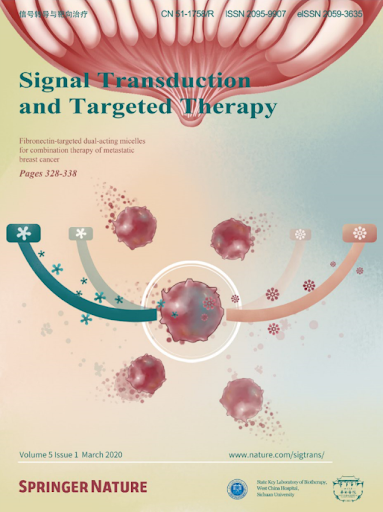泛酸激酶4通过调节辅酶A和谷氨酰胺水解来控制t细胞增殖的脂质合成。
IF 52.7
1区 医学
Q1 BIOCHEMISTRY & MOLECULAR BIOLOGY
引用次数: 0
摘要
在T细胞介导的炎症反应中,T细胞在识别抗原呈递细胞呈递的特定抗原时被激活。这种识别通过TCR和CD28启动信号传导,导致它们的激活和随后的克隆扩增。在由TCR和CD28结合触发的信号级联中,CD28- pi3k通路作为T细胞代谢重编程的中心调节器,支持T细胞有效增殖所必需的生物合成需求。在本研究中,我们发现PANK4的调控通过调节新生脂质合成在TCR/ cd28介导的CD4+ t细胞增殖中发挥作用。CD28信号通路通过直接与PDK1结合负向调控PANK4,从而控制CD4+ t细胞增殖的脂质合成。有趣的是,我们发现pank4缺陷的CD4+ T细胞增强了辅酶A的合成和谷氨酰胺水解,其中谷氨酰胺为脂肪酸合成提供碳,为辅酶A的生物合成提供氮。PANK4对CD4+ T细胞增殖的调节作用在实验性结肠炎和甲型流感病毒感染模型中得到证实,PANK4缺陷的CD4+ T细胞在共转移时比其野生型的CD4+ T细胞表现出更大的扩增。我们的研究结果表明,PANK4对新生脂质合成的调节对于TCR/ cd28诱导的CD4+ t细胞增殖至关重要,并且代表了调节一般CD4+ t细胞反应的潜在靶点。本文章由计算机程序翻译,如有差异,请以英文原文为准。
Pantothenate kinase 4 controls lipid synthesis for T-cell proliferation by modulating coenzyme A and glutaminolysis.
During T-cell-mediated inflammatory responses, T cells are activated upon recognizing specific antigens presented by antigen-presenting cells. This recognition initiates signaling through the TCR and CD28, leading to their activation and subsequent clonal expansion. Within the signaling cascades triggered by TCR and CD28 engagement, the CD28-PI3K pathway serves as a central regulator of metabolic reprogramming in T cells, supporting the biosynthetic needs essential for their effective proliferation. In this study, we found that the regulation of PANK4 plays a role in TCR/CD28-mediated CD4+ T-cell proliferation by regulating de novo lipid synthesis. The CD28 signaling pathway negatively regulates PANK4 through direct binding with PDK1, thereby controlling de novo lipid synthesis for CD4+ T-cell proliferation. Interestingly, we found that Pank4-deficient CD4+ T cells enhance coenzyme A synthesis and glutaminolysis, whereby glutamine contributes carbon for fatty acid synthesis and provides nitrogen for coenzyme A biosynthesis. The regulatory role of PANK4 in CD4+ T-cell proliferation was confirmed in models of experimental colitis and influenza A virus infection, where Pank4-deficient CD4+ T cells exhibited greater expansion than their wild-type counterparts when co-transferred. Our findings suggest that PANK4 regulation of de novo lipid synthesis is crucial for TCR/CD28-induced CD4+ T-cell proliferation and represents a potential target for modulating general CD4+ T-cell responses.
求助全文
通过发布文献求助,成功后即可免费获取论文全文。
去求助
来源期刊

Signal Transduction and Targeted Therapy
Biochemistry, Genetics and Molecular Biology-Genetics
CiteScore
44.50
自引率
1.50%
发文量
384
审稿时长
5 weeks
期刊介绍:
Signal Transduction and Targeted Therapy is an open access journal that focuses on timely publication of cutting-edge discoveries and advancements in basic science and clinical research related to signal transduction and targeted therapy.
Scope: The journal covers research on major human diseases, including, but not limited to:
Cancer,Cardiovascular diseases,Autoimmune diseases,Nervous system diseases.
 求助内容:
求助内容: 应助结果提醒方式:
应助结果提醒方式:


